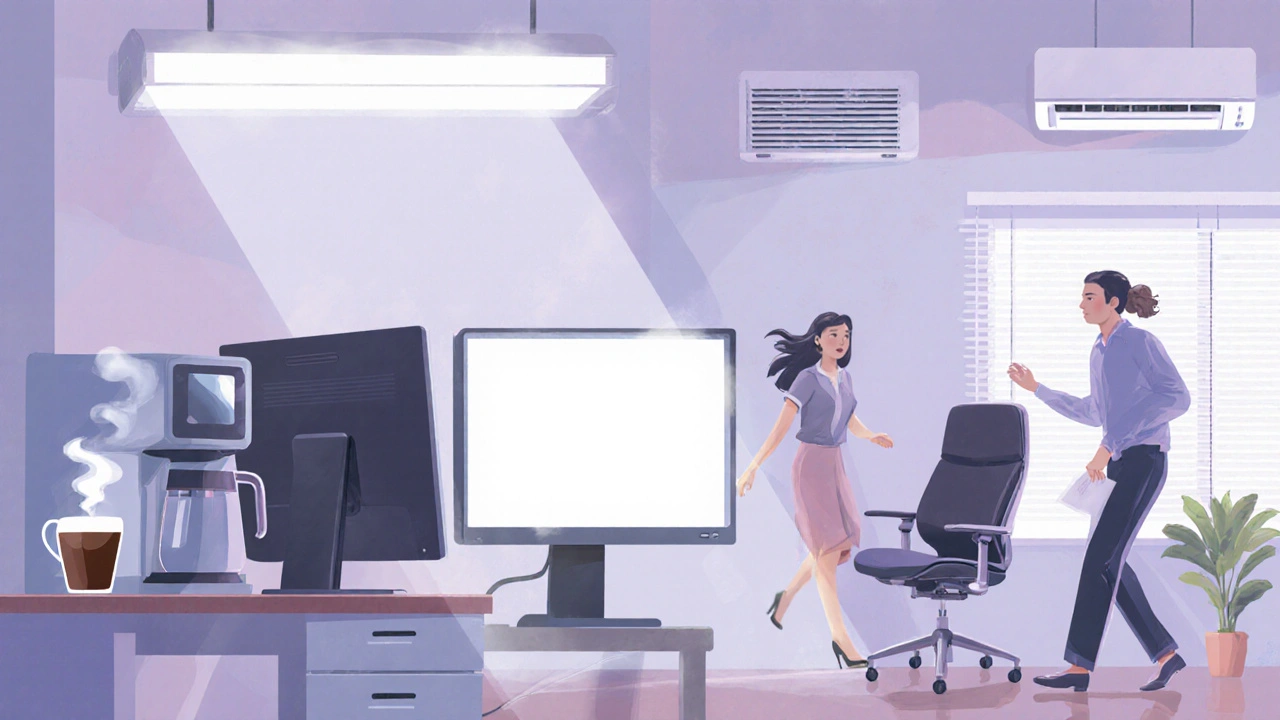TL;DR
- Drink water, eat a snack, and stand up slowly when you feel light‑headed.
- Check for common triggers: dehydration, low blood sugar, anemia, inner‑ear issues, stress.
- Adjust your workstation ergonomics and take short, frequent breaks.
- Log episodes and discuss them with occupational health if they repeat.
- Seek medical attention if dizziness lasts more than a few minutes or comes with chest pain, vision loss, or fainting.
What’s really happening when you feel dizziness at work?
First, let’s demystify the symptom. Dizziness at work is a vague term that covers a range of sensations-spinning, light‑headedness, or feeling about to faint. The underlying causes often fall into three buckets: circulatory, metabolic, and vestibular (inner‑ear). Understanding which bucket you belong to helps you pick the right remedy fast.
Common culprits you can spot quickly
Below is a quick‑reference table that matches the most frequent triggers with an immediate action you can take right at your desk.
| Cause | Typical sign | Instant fix |
|---|---|---|
| Dehydration | Dry mouth, thirst, dark urine | Drink 250‑300ml of water or an electrolyte drink |
| Low blood sugar | Shakiness, hunger, sweaty palms | Eat a carbohydrate snack (e.g., a banana or glucose tablet) |
| Anemia | Fatigue, pallor, shortness of breath | Take a short walk and consider iron‑rich foods; see a doctor for a test |
| Inner‑ear disorder (e.g., benign paroxysmal positional vertigo) | Spinning sensation that changes with head position | Perform the Epley maneuver or sit still until it passes |
| Stress or anxiety | Rapid breathing, tight chest, racing thoughts | Practice deep‑breathing (4‑2‑4) and pause work for a minute |
Step‑by‑step: What to do the moment you feel dizzy
- Stop what you’re doing. Sit or lean against a stable surface.
- Take three slow, deep breaths to calm the nervous system.
- Hydrate: sip water or an oral rehydration solution.
- If you suspect low blood sugar, grab a quick‑carb snack (a piece of fruit, crackers, or a granola bar).
- Check your posture. Adjust your chair so that your feet are flat and your knees are at a 90‑degree angle.
- Give yourself 2‑5 minutes to recover before resuming work.
These actions address most dehydration and low blood sugar episodes, which together account for roughly 60% of dizziness complaints in office settings, according to a 2023 occupational health survey.

Preventive habits that keep dizziness at bay
Prevention is easier than reacting to an episode, especially when you spend eight‑plus hours at a desk.
- Stay hydrated. Aim for at least 1.5L of water a day; keep a reusable bottle on your desk and refill it every couple of hours.
- Eat balanced meals. Include protein, complex carbs, and healthy fats. Skipping lunch is a fast track to low blood sugar.
- Move regularly. Stand, stretch, or walk for 3‑5 minutes every hour. Even a brief hallway stroll improves circulation and reduces orthostatic drops in blood pressure.
- Ergonomic workstation setup: monitor at eye level, keyboard at elbow height, and a footrest if your feet don’t reach the floor comfortably.
- Stress management techniques such as mindfulness, short meditation breaks, or a quick chat with a colleague can lower adrenaline spikes that trigger dizziness.
- Check air quality. Stale indoor air can lower oxygen levels, especially in crowded open‑plan offices. If you notice a stuffy environment, request a ventilation check.
When to bring in the professionals
Most dizzy spells resolve with the steps above, but you should see a health provider if:
- The episode lasts longer than 10minutes.
- You experience chest pain, shortness of breath, or visual disturbances.
- Episodes happen more than twice a week despite preventive measures.
- You're on medication that lists dizziness as a side effect (e.g., certain antihypertensives or antidepressants).
An occupational health specialist can run a basic screen: blood pressure check, blood glucose, hemoglobin level, and a quick vestibular assessment. If needed, they’ll refer you to an ENT doctor or a neurologist.
Workplace accommodations that help
If you have a chronic condition like anemia or an inner‑ear disorder, talk to your HR or occupational health team about reasonable adjustments.
- Flexible break schedule - a five‑minute pause every hour.
- Standing desk or adjustable sit‑stand workstation to avoid prolonged sitting.
- Access to a private quiet space for breathing exercises.
- Permission to keep water and snacks at your desk.
- Ergonomic chair with proper lumbar support.
Documenting the frequency and triggers of your episodes helps build a case for these accommodations. Most employers view health‑related adjustments as a win‑win for productivity and employee well‑being.
Quick checklist to keep at your desk
- Water bottle (filled)
- Healthy snack (nuts, fruit, whole‑grain crackers)
- Copy of your occupational health contact
- Post‑it reminder: “Sit up straight, breathe deep”
- Mini‑first‑aid guide for the Epley maneuver (if prone to vertigo)

Frequently Asked Questions
Can caffeine cause dizziness at work?
Yes. While caffeine can boost alertness, it also narrows blood vessels, which sometimes leads to a temporary drop in blood flow to the brain, especially if you’re dehydrated. Limit coffee to 1‑2 cups and balance it with water.
Is it safe to take over‑the‑counter antihistamines if I feel dizzy?
Many antihistamines (especially first‑generation ones) list dizziness as a common side effect. If you need allergy relief, opt for a non‑sedating second‑generation product and monitor how you feel.
How often should I stand up to avoid dizziness?
A good rule is the 20‑20‑20 rule for eyes and the 60‑minute rule for movement: every 60 minutes, stand, stretch, or walk for at least two minutes.
Can low iron levels cause dizziness?
Absolutely. Iron deficiency reduces the blood’s ability to carry oxygen, leading to fatigue and light‑headedness. A simple blood test can confirm, and iron‑rich foods or supplements can help.
What’s the best way to breathe during a dizzy spell?
Try the 4‑2‑4 method: inhale for four seconds, hold for two, then exhale for four. This slows heart rate and steadies blood pressure.



Nicole Povelikin
September 29, 2025 at 00:53I’ve noticed that most office water coolers actually dispense lukewarm water, which can actually exaserbate dehydration rather than help it.
Michelle Weaver
September 29, 2025 at 01:01Staying hydrated is key 🍶 remember to sip water regularly and keep a healthy snack at your desk to maintain blood sugar levels 😊
John Keough
September 29, 2025 at 01:10Adding a quick 2‑minute standing break every hour can boost circulation and reduce orthostatic drops, which helps keep dizziness at bay while also improving overall focus.
Graham Smith
September 29, 2025 at 01:18Just a quick note: the phrase “keep a healthy snack at your desk” should be “keep healthy snacks at your desk” for proper subject‑verb agreement.
Jeremiah Morgan
September 29, 2025 at 01:26First, let me acknowledge how challenging it can be to experience dizziness amidst a busy workday, and know that you are not alone in this struggle. Many employees dismiss these episodes as minor inconveniences, but the cumulative impact on productivity and well‑being can be significant. It is essential to adopt a proactive mindset that combines immediate relief strategies with long‑term preventive habits. For instance, keeping a reusable water bottle filled encourages consistent hydration, which addresses one of the most common triggers. Pairing hydration with a balanced snack that includes protein and complex carbs stabilizes blood glucose levels throughout the afternoon. Additionally, adjusting your workstation ergonomics-such as ensuring your monitor is at eye level and your chair supports proper posture-reduces strain on the vestibular system. Regular micro‑breaks, ideally two minutes every hour, promote circulation and prevent the pooling of blood in the lower extremities. Incorporating brief mindfulness or deep‑breathing exercises can also mitigate stress‑induced dizziness, as the autonomic nervous system calms down. If you suspect an inner‑ear issue, the Epley maneuver performed correctly can provide rapid relief, but it is advisable to seek guidance from a qualified professional first. Documenting each episode, noting the time, activity, and any potential triggers, creates valuable data that you can share with occupational health. This documentation not only aids in accurate diagnosis but also strengthens your case for reasonable workplace accommodations. Remember that many employers are receptive to adjustments such as flexible break schedules or standing desks when presented with clear evidence. Finally, do not hesitate to consult a healthcare provider if spells persist longer than ten minutes or are accompanied by chest pain, visual changes, or fainting. Early intervention can uncover underlying conditions such as anemia or cardiovascular issues that require treatment. Stay optimistic, be cconsistent with these habits, and trust that your efforts will lead to noticeable improvements over time.
nina greer
September 29, 2025 at 01:35One must prioritize physiological equilibrium to sustain occupational efficacy.
Montague Tilmen
September 29, 2025 at 01:43We must enforce stricter workplace health standards.
Clarise Wheller
September 29, 2025 at 01:51I completely agree; fostering a culture that values health will only boost our collective performance.
Riley Fox
September 29, 2025 at 02:00Indeed-if we consider the body as a micro‑cosm, then each interruption of homeostasis becomes a philosophical reminder of our fragility; thus, by nurturing our physical vessel, we also nourish the soul 😊.
Adam Craddock
September 29, 2025 at 02:08Clinical assessment of vestibular function often includes the Dix‑Hallpike test, which helps differentiate benign paroxysmal positional vertigo from other causes.
Kimberly Dierkhising
September 29, 2025 at 02:16From a systems‑thinking perspective, integrating hydration protocols into the office's operational workflow can reduce incident frequency and align with broader occupational health KPIs.
Rich Martin
September 29, 2025 at 02:25Exactly, and if we view dizziness as a signal of systemic overload, then demanding immediate remediation becomes an act of self‑preservation, not selfishness.
Buddy Sloan
September 29, 2025 at 02:33👍 Stay safe and remember you’ve got support from the team!
SHIVA DALAI
September 29, 2025 at 02:41Behold, the silent storm that besieges the diligent worker, a tempest of lightness that threatens to unmoor the very soul of labor.
Vikas Kale
September 29, 2025 at 02:50Statistically, about 12 % of office workers report at least one dizzy episode per month, highlighting the need for evidence‑based interventions 🚀.